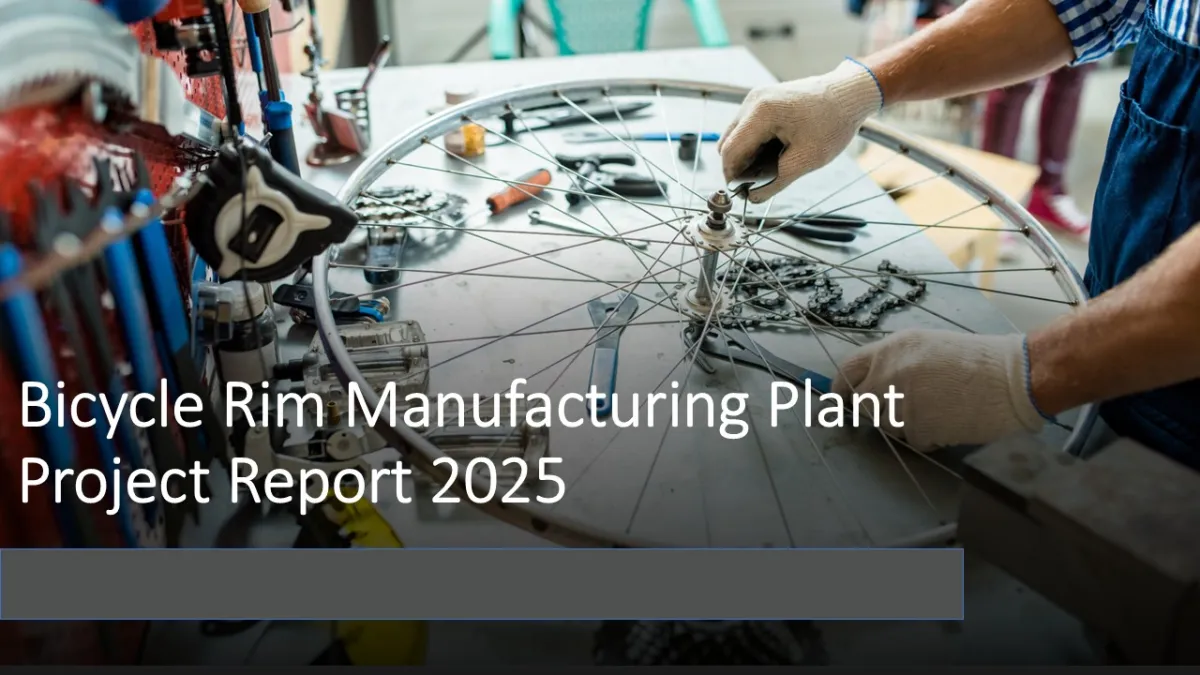
Bicycle Rim Manufacturing Plant Setup 2025: Machinery, Cost, And Profitability Guide
Setting up a bicycle rim manufacturing plant requires careful planning, including site selection, procurement of machinery for extrusion, welding, drilling, and finishing, as well as sourcing quality raw materials. Efficient plant layout, skilled labor, quality control systems, and adherence to industry standards are essential for ensuring production efficiency and competitiveness in the global market.
IMARC Group's report, titled “ Bicycle Rim Manufacturing Plant Project Report 2025: Industry Trends, Plant Setup, Machinery, Raw Materials, Investment Opportunities, Cost and Revenue,” provides a complete roadmap for setting up a bicycle rim manufacturing plant. It covers a comprehensive market overview to micro-level information such as unit operations involved, raw material requirements, utility requirements, infrastructure requirements, machinery and technology requirements, manpower requirements, packaging requirements, transportation requirements, etc.
Request for a Sample Report : https://www.imarcgroup.com/bicycle-rim-manufacturing-plant-project-report/requestsample
Bicycle Rim Industry outlook 2025:
The bicycle rim industry outlook for 2025 indicates steady growth driven by rising demand for eco-friendly transportation, fitness activities, and expanding cycling infrastructure worldwide. Increasing adoption of lightweight materials such as aluminum alloys and carbon fiber is enhancing performance, durability, and efficiency, further boosting market opportunities. Urbanization and government initiatives promoting sustainable mobility are expected to accelerate sales, particularly in Asia-Pacific and Europe. Moreover, the growing popularity of e-bikes and premium bicycles is creating demand for advanced rim technologies. With heightened consumer focus on quality, safety, and aerodynamics, manufacturers are investing in innovation to gain a competitive edge.
Key Insights for Bicycle Rim Manufacturing Plant Setup:
Detailed Process Flow:
-
Product Overview
Unit Operations Involved
Mass Balance and Raw Material Requirements
Quality Assurance Criteria
Technical Tests
Project Details, Requirements and Costs Involved:
-
Land, Location and Site Development
Plant Layout
Machinery Requirements and Costs
Raw Material Requirements and Costs
Packaging Requirements and Costs
Transportation Requirements and Costs
Utility Requirements and Costs
Human Resource Requirements and Costs
Capital Expenditure (CapEx) and Operational Expenditure (OpEx) Analysis:
Project Economics:
-
Capital Investments
Operating Costs
Expenditure Projections
Revenue Projections
Taxation and Depreciation
Profit Projections
Financial Analysis
Profitability Analysis:
-
Total Income
Total Expenditure
Gross Profit
Gross Margin
Net Profit
Net Margin
Key Cost Components of Setting Up a Bicycle Rim Plant :
-
Land and Infrastructure: Cost of land acquisition, factory construction, utilities setup, and storage facilities.
Machinery and Equipment: Investment in extrusion machines, welding units, drilling systems, surface finishing, and quality testing equipment.
Raw Materials: Procurement of aluminum alloys, carbon fiber, steel, and other essential inputs.
Labor and Workforce: Expenses for skilled and unskilled labor, training, and management staff.
Utilities and Energy: Electricity, water, and fuel requirements for manufacturing operations.
Quality Control and Testing: Equipment and processes to ensure compliance with industry standards.
Packaging and Distribution: Costs for packing materials, logistics, and supply chain setup.
Regulatory Compliance: Licenses, environmental clearances, and safety certifications.
Research and Development: Continuous investment in product innovation and process optimization.
Working Capital: Funds for day-to-day operations, maintenance, and inventory management.
Economic Trends Influencing Bicycle Rim Plant Setup Costs 2025 :
-
Raw Material Price Volatility: Fluctuations in aluminum and carbon fiber prices directly impact manufacturing costs.
Global Inflationary Pressures: Rising costs of energy, transportation, and construction materials increase overall capital expenditure.
Labor Market Dynamics: Higher wages and demand for skilled technical labor influence operational expenses.
Supply Chain Disruptions: Geopolitical tensions and shipping delays affect raw material availability and logistics costs.
Technological Advancements: Adoption of automation and precision machinery raises initial investment but reduces long-term costs.
Government Incentives: Subsidies, tax benefits, and green manufacturing policies lower setup costs in select regions.
Currency Fluctuations: Exchange rate volatility impacts imported machinery and raw material costs.
Speak to an Analyst for Customized Report: https://www.imarcgroup.com/request?type=report&id=13643&flag=E
Challenges and Considerations for Investors in Bicycle Rim Plant Projects:
-
High Initial Capital Requirement: Significant investment needed for land, machinery, and technology acquisition.
Raw Material Dependency: Price fluctuations and supply instability of aluminum, carbon fiber, or steel can affect margins.
Technological Barriers: Need for advanced machinery and precision processes to meet international quality standards.
Market Competition: Presence of established global and regional manufacturers intensifies competitive pressure.
Regulatory Compliance: Adherence to environmental, safety, and industry-specific standards adds to operational complexity.
Skilled Workforce Availability: Recruiting and retaining trained technicians and engineers may pose challenges.
Demand Fluctuations: Seasonal variations and economic downturns can impact sales and capacity utilization.
Supply Chain Risks: Logistics disruptions and dependence on imported machinery increase operational vulnerabilities.
Conclusion:
The bicycle rim manufacturing industry presents strong growth potential, supported by rising global demand for sustainable mobility solutions, advancements in lightweight materials, and the expanding popularity of e-bikes and premium bicycles. However, establishing a rim production facility requires careful consideration of capital investment, raw material dependency, regulatory compliance, and competitive market dynamics. Strategic planning in technology adoption, supply chain management, and quality assurance is essential for long-term success. With supportive government policies and increasing consumer focus on performance-oriented products, investors entering this sector in 2025 are well-positioned to capitalize on emerging opportunities while mitigating associated risks.
Buy Now : https://www.imarcgroup.com/checkout?id=13643&method=1911
About Us:
IMARC Group is a global management consulting firm that helps the world's most ambitious changemakers to create a lasting impact. The company excel in understanding its client's business priorities and delivering tailored solutions that drive meaningful outcomes. We provide a comprehensive suite of market entry and expansion services. Our offerings include thorough market assessment, feasibility studies, company incorporation assistance, factory setup support, regulatory approvals and licensing navigation, branding, marketing and sales strategies, competitive landscape, and benchmarking analyses, pricing and cost research, and procurement research.
Contact Us:
IMARC Group
134 N 4th St. Brooklyn, NY 11249, USA
Email: sales[@]imarcgroup.com
Tel No:(D) +91 120 433 0800
United States: (+1-201971-6302)
Legal Disclaimer:
MENAFN provides the
information “as is” without warranty of any kind. We do not accept
any responsibility or liability for the accuracy, content, images,
videos, licenses, completeness, legality, or reliability of the information
contained in this article. If you have any complaints or copyright
issues related to this article, kindly contact the provider above.


















Comments
No comment